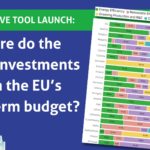To: EU energy ministers, EU 27
Brussels, October 10, 2022
Dear Minister,
Last year, the European Commission published its proposed reforms of the European Union’s gas market rules, called the Hydrogen and Decarbonised Gas Market Package (referred to as ‘the Gas Package’). The proposed legislation aimed to set out rules to support the decarbonisation of Europe’s gas system, primarily by facilitating the replacement of fossil gas with so-called ‘decarbonised gases’, including hydrogen and biomethane.
Even before the publication of the Commission’s proposals, the energy price crisis had rendered the draft out of date and civil society organisations have called repeatedly for revising the Gas Package’s Impact Assessment. However, the war in Ukraine has had an unprecedented impact on the EU’s energy market, leading to an acceleration of the energy transition and a serious reevaluation of the future role of gas in Europe.
We believe that the current debate on the revision of the Gas Package by Member States and the European Parliament is based on outdated assumptions and an incomplete assessment of the relevant risks. We call upon the European Commission and co-legislators to take into account the radically changed realities in the following areas:
Gas demand will decline faster. The Commission’s REPowerEU analysis indicates a 60% decline in final gas demand by 2030, a doubling of gas demand reductions under the Fit For 55 Package. The ‘Save Gas for a Safe Winter’ Plan, which mandates a 15% voluntary reduction in EU gas consumption, represents a further fall of 45 billion cubic metres in European gas consumption over nine months. Furthermore, several Member States, including the largest national gas markets in Europe, have announced new national policies to reduce gas demand, many of which have permanent impacts on gas demand such as gas boiler bans.
The era of cheap gas is over. High energy prices are causing a cost of living crisis in Europe and beyond, pushing millions of vulnerable households further into poverty. European wholesale gas prices are currently much higher than in 2021 and gas prices are not expected to return to pre-COVID levels in the next decade. The Commission acknowledges increased gas price projections in its REPowerEU analysis however these updated gas cost assumptions, together with the associated impact on the competitive advantage of alternative technologies such as renewable energy, are not part of the debate on the Gas Package.
While the Commission was not able to foresee recent events, it is essential that EU decision makers take the new reality of gas prices and its full implications into account. This includes the risk of locking Europe into expensive long-term LNG supply contracts, the climate impacts of increased reliance on fracked gas, and the broader geopolitical, social and economic risks that this represents.
High gas prices mean less fossil-based hydrogen. The Commission’s Gas Package reform proposals rely heavily on the availability of ‘decarbonised gases’, primarily hydrogen and biomethane. Hydrogen produced from fossil gas is problematic for many reasons, including its reliance on carbon capture and storage technology. The increase in gas prices creates a new one: 99 % of hydrogen produced globally is based on fossil fuels, a majority of which is made with fossil gas, and is therefore strongly impacted by both lower gas availability as well as higher gas prices. While REPowerEU proposes to increase the availability of renewable hydrogen, it makes most sense to use additional renewable electricity capacity to displace gas in Europe’s power markets before using it to produce hydrogen. As such, renewable hydrogen will remain an expensive and scarce fuel, which should be channelled towards limited end uses (sectors where direct electrification is not possible such as certain resources and energy intensive industries like steel and basic chemicals). In this context, the case for investing large sums to convert significant shares of European transmission, and particularly distribution, networks to transport hydrogen, a key element in the Gas Package revision, is weakened further. It is essential that the Gas Package mitigates the risk of expensive and unnecessary investments in hydrogen, or ‘hydrogen-ready’ networks increasing costs for Europeans, already suffering from unprecedented energy bills.
Increasingly visible impacts of climate change in Europe as well as unprecedented changes in Europe’s energy system in the past year are not reflected in the current debate on the Gas Package. We call on EU decision makers to take into account the new realities regarding the role of gas in Europe’s energy system and ensure a just transition for all Europeans. This would require a revision of the Commission’s initial Impact Assessment to integrate those new elements and pausing the ongoing discussions on the reform of Europe’s gas market rules in Parliament and Council.
Chiara Martinelli, Director, Climate Action Network (CAN) Europe, on behalf of:
(Signatory NGO logos)
PDF of the letter here.



